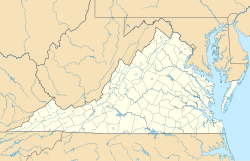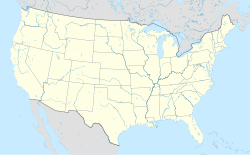Little England is a historic plantation house located near Gloucester, Gloucester County, Virginia. The plantation dates to a 1651 land grant to the Perrin family by Governor William Berkeley. Capt. John Perrin built the house on a point of land overlooking the York River directly across from Yorktown in 1716 with plans reputed to have been drawn by Christopher Wren. The house was used as a lookout for ships during the Battle of Yorktown. It is a 2+1⁄2-story, five-bay, gable roofed brick dwelling in the Georgian style. A 1+1⁄2-story frame wing was added in 1954. It has a single-pile plan and two interior end chimneys. The brickwork is Flemish Bond with few glazed headers. Little England is one of Virginia's least altered and best-preserved colonial plantation homes. The interior features some of the finest colonial paneling in Virginia.
Little England | |
 Little England, HABS Photo | |
| Location | E of Gloucester on VA 672, near Gloucester, Virginia |
|---|---|
| Coordinates | 37°15′09″N 76°28′33″W / 37.25250°N 76.47583°W |
| Area | 70 acres (28 ha) |
| Built | c. 1775 |
| Built by | Ariss, John; Willing, Charles |
| Architectural style | Georgian |
| NRHP reference No. | 70000795[1] |
| VLR No. | 036-0030 |
| Significant dates | |
| Added to NRHP | December 18, 1970 |
| Designated VLR | October 6, 1970[2] |
The house was restored in 1939.[3]
It was added to the National Register of Historic Places in 1970.[1]
See also
editReferences
edit- ^ a b "National Register Information System". National Register of Historic Places. National Park Service. July 9, 2010.
- ^ "Virginia Landmarks Register". Virginia Department of Historic Resources. Retrieved 5 June 2013.
- ^ Virginia Historic Landmarks Commission (August 1970). "National Register of Historic Places Inventory/Nomination: Little England" (PDF). Virginia Department of Historic Resources. and Accompanying photo

